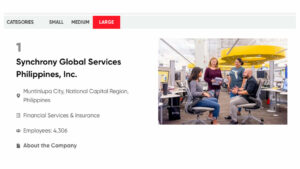
IT-BPM firms dominate list of ‘best workplaces’
INFORMATION TECHNOLOGY and business process management (IT-BPM) companies featured prominently in the fifth annual Best Workplaces List in the Philippines, according to the list’s compiler, Great Place to Work (GPTW).
“Many of these organizations are from the IT-BPM industry, primarily (from the point of view of hiring) a lot of employees,” GPTW Philippines Managing Partner Antoniette Mendoza-Talosig told reporters on the sidelines of the awards ceremony late Tuesday.
“Historically, we’ve already seen that (IT-BPM companies) are putting much effort into employee satisfaction or employee happiness,” Ms. Mendoza-Talosig said.
She said that IT-BPM companies on the list are listening to their employees on flexible work arrangements.
One example, she said, is Synchrony Global Services, Inc., the top workplace in the list for companies with 1,000 and more workers, which has decided to embrace remote work.
She said the company noticed a downward trend in employee engagement, with departures resulting from the announcement of the initial return-to-office order.
“So they listened to their employees and implemented remote work, which has improved their employees’ experience substantially,” she added.
Synchrony was also awarded the “Great Place to Work Legend” title for being on the list for five consecutive years, together with DHL Express Philippines, which topped the list in the medium category — companies with 100 to 999 employees.
The other top workplaces in the large category are Accenture, TaskUs, Lexmark Research and Development Corp., Teleperformance, Capital One Philippines, DXC Technology Philippines, CGI Philippines, Inc., [24]7.ai Philippines, and Tech Mahindra Ltd. Philippines.
For the medium category, the other companies on the list were Cisco, Hilton, Atlassian, Via Appia Philippines, Inc., 3M GSC Philippines, Hilti Philippines, Inc., Balsam International Unlimited Co. Philippine ROHQ, General Motors Philippines, Lingaro (Philippines), Inc., Amadeus Marketing Philippines, Inc., SCJ Philippines, Aurecon, Genesys Cloud Services Cayman Ltd., and Thumbtack Philippines.
Ms. Mendoza-Talosig said there were 15 awardees for the medium category, as there were more entrants for companies with 100 to 999 employees.
Meanwhile, the list for the small category (companies with 10-99 employees) was included Kollab, ECo Global Consulting, Inc., Limitless Connect, Logix BPO, Zenutna Holdings Corp., Takeda Healthcare Philippines, Inc., J4RVIS, Interconnected Business Process, Inc., Fulcrum Solutions, and Air Accounting.
Jack Madrid, president of the IT and Business Process Association of the Philippines, said that the recognition that the industry is a good one to work for shows how employees recognize the successes of IT-BPM companies.
“It’s heartening because it proves that the IT-BPM industry is really founded on that bedrock of Filipino talent,” Mr. Madrid said.
He said that over half of the awardees are from the IT-BPM industry, which will spur further efforts to improve the work environment within the sector.
“I think work flexibility will always be important,” he said. “Flexibility is here to stay, but having said that, we are also seeing a gradual uptick of employees going back to the office. It’s moving towards that, but at a slow pace,” he added.
Ms. Mendoza-Talosig said that overall, GPTW reported a downward trend in employee experience in the Philippines, with only the awardees being able to sustain their performance.
“There are many factors that we are seeing, and I think one is the rapid changes in the organization. One will be artificial intelligence (AI). How are organizations supporting their employees when it comes to AI?” she said.
“Second, I would say, would be economic factors. Anywhere, not just in the Philippines, employee dissatisfaction about pay is increasing, but pay has always been what we call a universal dissatisfier,” she added.
She said that one of the reasons for the downward trend would also be the employees’ dissatisfaction with psychological safety in the workplaces in the Philippines.
Around 77% of employees of ‘not best workplaces’ said that their companies are a psychologically and emotionally healthy place for work, which is well below the 90% of employees of ‘best workplaces’ who agreed that they have psychologically healthy workplace.
“There’s a big discrepancy. And many of the organizations that you see in that data actually include companies (on the list). So imagine employees who work for companies (not on the list),” she said.
Now in its fifth year, the Best Workplaces List in the Philippines was compiled from the responses of over 600,000 employees across 200 different organizations that subscribe to the Great Place to Work Model. — Justine Irish D. Tabile



